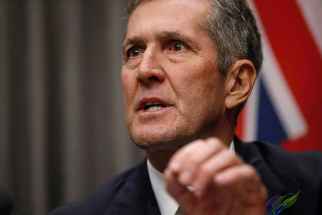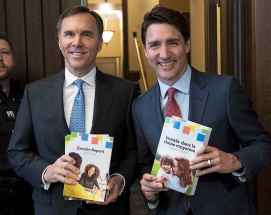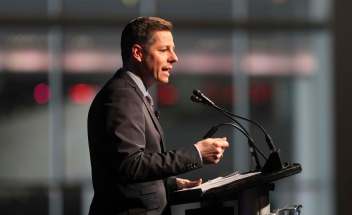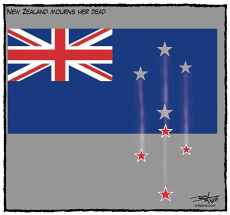Liberals’ budget: something for everyone Billions of dollars expected to flow through vaguely defined programs across the country before October election
Read this article for free:
or
Already have an account? Log in here »
To continue reading, please subscribe:
Monthly Digital Subscription
$0 for the first 4 weeks*
- Enjoy unlimited reading on winnipegfreepress.com
- Read the E-Edition, our digital replica newspaper
- Access News Break, our award-winning app
- Play interactive puzzles
*No charge for 4 weeks then price increases to the regular rate of $19.00 plus GST every four weeks. Offer available to new and qualified returning subscribers only. Cancel any time.
Monthly Digital Subscription
$4.75/week*
- Enjoy unlimited reading on winnipegfreepress.com
- Read the E-Edition, our digital replica newspaper
- Access News Break, our award-winning app
- Play interactive puzzles
*Billed as $19 plus GST every four weeks. Cancel any time.
To continue reading, please subscribe:
Add Free Press access to your Brandon Sun subscription for only an additional
$1 for the first 4 weeks*
*Your next subscription payment will increase by $1.00 and you will be charged $16.99 plus GST for four weeks. After four weeks, your payment will increase to $23.99 plus GST every four weeks.
Read unlimited articles for free today:
or
Already have an account? Log in here »
Hey there, time traveller!
This article was published 19/03/2019 (2460 days ago), so information in it may no longer be current.
OTTAWA — Prime Minister Justin Trudeau’s pre-election budget outlined perks for almost every Canadian, using up Ottawa’s wiggle room to spread cash across an array of vaguely defined programs.
Winnipeggers can expect to see a flurry of spending announcements leading up to the October vote, from transportation and flood relief to an air ambulance and Indigenous community centres.
Ottawa is also uncorking billions for urban infrastructure needs amid difficulties with provinces such as Manitoba, while promising some sort of an economic strategy for Western Canada.
After budgets focused on building infrastructure, the gender-pay gap and innovation, Finance Minister Bill Morneau tabled a more general spending plan that touches lightly on skills by giving employees a paid week off work each year to undertake training.
Morneau argued that strong job numbers and a lower debt than anticipated will justify his decision to increase government spending.
"I hope that Canadians will look at what we’ve done since the beginning, and say that these people that we elected promised to make investments into the success of me and my family," he told reporters Tuesday afternoon.
Economists have argued that gives Ottawa limited room to manoeuvre whenever the next recession hits, but Morneau contended that spending "in a fiscally responsible way" was better than making cuts that would have slowed economic growth.
Selkirk-area Conservative MP James Bezan slagged the new spending — amounting to $22.8 billion over the next six years — as historically high and “incredibly disappointing,” given Trudeau’s pledge to balance his final budget.
Budget contains numerous pledges
OTTAWA — Tuesday’s 450-page budget contains hundreds of funding commitments, some of which might resonate in the Prairies.
The budget outlined funding to help identify and remove interprovincial trader barriers, and noted that the fledgling private-public “infrastructure bank” could help connect provinces’ power grids, but it did not specifically cite helping Manitoba Hydro to link with Saskatchewan or Nunavut, which Selkirk-Interlake-Eastman Tory MP James Bezan called a “missed opportunity.”
OTTAWA — Tuesday’s 450-page budget contains hundreds of funding commitments, some of which might resonate in the Prairies.
The budget outlined funding to help identify and remove interprovincial trader barriers, and noted that the fledgling private-public “infrastructure bank” could help connect provinces’ power grids, but it did not specifically cite helping Manitoba Hydro to link with Saskatchewan or Nunavut, which Selkirk-Interlake-Eastman Tory MP James Bezan called a “missed opportunity.”
Tuesday’s budget revealed that Ottawa will launch consultations on whether Saskatchewan’s carbon-quota regime for large emitters could operate under the federal carbon tax.
Manitoba Premier Brian Pallister has long pushed for Ottawa to make some sort of accommodation in the carbon levy for his province’s hydro glut; he claimed the Liberals refused to consider that idea.
The budget also pledged first steps to have Canada negotiate drug prices as one country instead of various provincial groupings; that could eventually save $3 billion a year. Ottawa is now taking steps to harmonize which drugs provinces cover, something that could lead to further savings.
The Liberals intend to wait for an early summer report on pharmacare before deciding their election pledge.
The government also promised some sort of a bill to protect pensions, which unions have pushed for since Sears Canada declared bankruptcy and used a portion of pensions to pay off shareholders. It’s unclear how likely such a bill would pass, given the few seating weeks that remain.
Meanwhile, beefed-up support for first-time homebuyers will likely most help the Liberals in swing ridings around Toronto, Montreal and Vancouver.
— Dylan Robertson
Kevin Page, Canada’s former parliamentary budget officer, said the spending seemed reasonable, but not enough to distract from the SNC-Lavalin scandal.
"What is this budget about? It’s a modest amount of measures and a lot of money," he said. "You can’t really focus on one thing."
Among the federal measures is a last-minute, $2.2-billion push to get infrastructure projects underway, by giving municipalities a one-time doubling of revenue from a levy that has been collected at gas pumps for years.
The Liberals have been stymied in trying to get shovels in the ground under their massive infrastructure plan. Critics say that’s because of onerous paperwork and tight criteria, while the government insists it’s because provinces aren’t willing to pay a large enough share to get projects underway. Morneau listed Manitoba among four provinces where that’s been a particular issue.
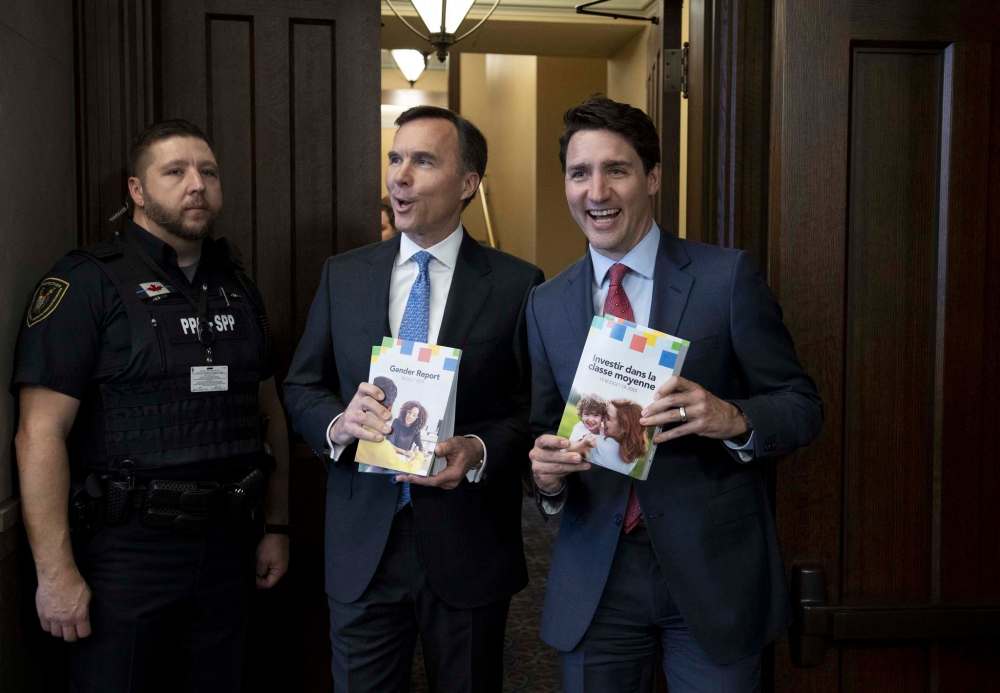
"We’ve not been able to get as many projects done in some places… as we’d like. So we’ve put a municipal infrastructure pot up, to make sure that more of the projects get done," he said before taking a jab at those provinces.
"We’re going to work with people that want to work with us, to make sure that that happens."
Page, who now heads the Institute of Fiscal Studies and Democracy think-tank at the University of Ottawa, said remitting money to cities recognizes the fact that provinces and cities generally have unsustainable amounts of debt, and can’t put out new spending as easily as the federal government.
Money for news: Few details
OTTAWA — The federal Liberals have unveiled how they plan to subsidize the troubled news industry in Canada, though they still have no timeline for when most of the money would flow.
The Liberals announced intentions to spend $595 million over five years to support Canada’s news industry, which has seen frequent layoffs over the past decade. Tuesday’s federal budget revealed hints at who will qualify.
OTTAWA — The federal Liberals have unveiled how they plan to subsidize the troubled news industry in Canada, though they still have no timeline for when most of the money would flow.
The Liberals announced intentions to spend $595 million over five years to support Canada’s news industry, which has seen frequent layoffs over the past decade. Tuesday’s federal budget revealed hints at who will qualify.
The funding is divvied into three categories. It will allow journalism organizations to register as non-profits, in order to accept donations and issue income-tax receipts. A labour tax credit will lower newsrooms’ tax bills based on how many journalists they employ. Meanwhile, a consumer tax credit will let people deduct their subscriptions to “Canadian digital news.”
Bob Cox, the publisher of this newspaper, is chair of the News Media Canada, which has lobbied Ottawa to help fund the news industry. He argued the “significant” funding will strengthen communities across the country.
“This will make a difference in newsrooms across Canada,” he wrote in a statement. “We thank the government for recognizing the challenges faced by the industry and giving us a helping hand to create the newsrooms of the future.”
While Ottawa still has to form an arms-length panel to determine which agencies would be eligible, the budget makes it clear that the tax measures will only apply to organizations residing in Canada.
News outlets must be registered as a corporation, partnership or trust and have at least 75 per cent of directors or shareholders be Canadian citizens. News organizations must employ two journalists who don’t work in management and are “primarily engaged in the production of original news content,” defined as “matters of general interest and reports of current events” and not those specifically focused on industries, sports or arts.
"To transfer money into the pockets of municipalities can be one way to… provide some breathing space," he said.
Bezan called the measure “one of very few positive items we’re seeing in this budget; the rest of it is underwhelming." He said the Liberals have been "too concerned about corporate cronyism" in the SNC-Lavalin scandal to craft better, more specific pledges.
Meanwhile, Ottawa is putting up $1.7 billion over five years to enable Canadians to take a week off work each year to take certified courses, allowing them bank up to four weeks at a time and receive income through a mix of employment insurance and federal credits.
Hassan Yussuff, head of the Canadian Labour Congress, called it a watershed moment in how Ottawa provides support for skills, which currently happens only after someone loses their job.
"For the first time there’s an acknowledgment that you have a right to go and get training," he said.
Ottawa will pass legislation that bars employers from punishing or firing workers who take on such training. The government will pay almost all costs involved, and said it plans to compensate small- and medium-size businesses to help them plan around such absences.
Yussuff pointed out that this will apply only to federally regulated workplaces, and that provinces will have to enact their own laws. He noted that the new federal cash will top up existing labour transfers to provinces.
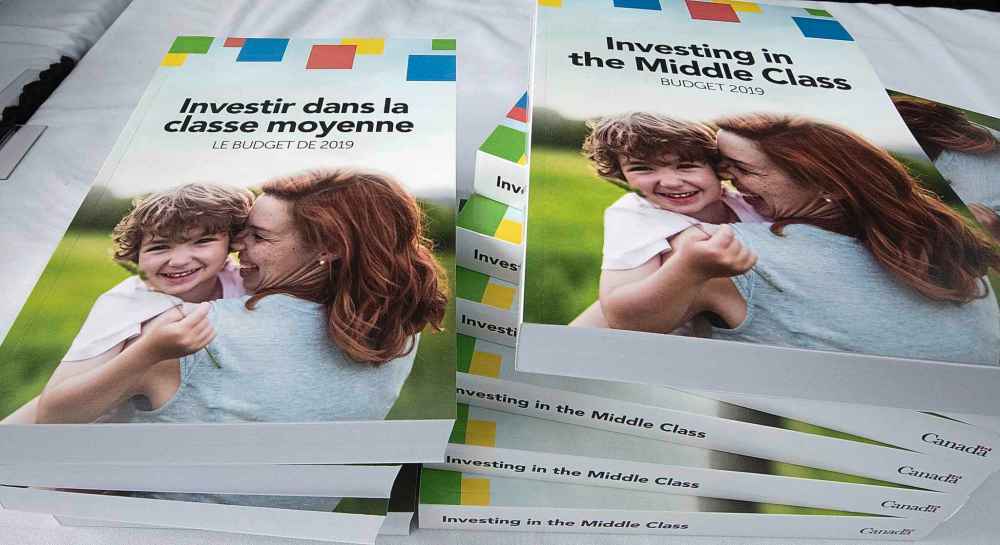
"There’s no reason for them to oppose bringing forth legislation to protect people to go back to their job, because it costs them nothing," he said.
The measure may be one way to address stagnant wage growth. Although the Liberals have landed flattering employment and poverty numbers, economists are concerned that wages are not keeping up with rising living costs, especially for the middle class.
Ottawa is allotting $100 million to "develop a Western Canada Growth Strategy which will reflect the unique regional advantages of each province," which it hints involves attracting investors and getting "under-represented groups" working. Another $1 million will help co-ordinate how Prairie provinces prevent floods and respond to them.
Tuesday’s budget allocated $65 million for STARS air ambulance across the Prairies. STARS said Tuesday that would be enough money for five of the nine helicopters it needs to be replaced, including one in Manitoba.
Just days after proposing to close a loophole that has seen thousands of asylum seekers cross into Canada from the United States, the Liberals are pledging $1.18 billion to beef up border patrols and help clear the years-long refugee-hearing backlog.
“They are trying to adjust their narrative to match what Canadians are actually expecting,” Bezan said. “They have spent the last 3 1/2 years on the wrong side of this issue, based upon the public’s view.”
dylan.robertson@freepress.mb.ca
History
Updated on Tuesday, March 19, 2019 3:46 PM CDT: Updates headline









